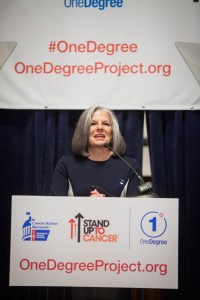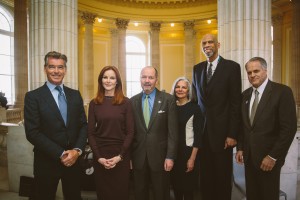 I'm honored to have Dr. Julie Gerberding contribute her voice to my blog. Dr. Gerberding is the current executive vice president for population health at Merck and formerly served as the director of the U.S. Centers for Disease Control and Prevention. Merck was a generous sponsor of our One Degree Project launch event, and her presence contributed to that memorable day.ξ When it comes to cancer, my family is batting .400. My mom, uncle, and maternal grandparents survived cancer. But six of my other loved ones - including three aunts with breast cancer, an aunt with HPV-related vaginal cancer, my paternal grandfather with lung cancer, and my father with multiple myeloma - were not so fortunate. A record of .400 is an extraordinary feat for baseball stars like my dad's idol, Ted Williams, but is a very sad statistic for a close-knit family like mine. I know I am not alone in being touched by cancer in fact, this is a universal experience in America. But I was heartened to participate in the One Degree campaign launch in Washington, DC last week, to help raise awareness about the way cancer touches all of us and the importance of sustained federal funding for cancer research. The good news is that extraordinary progress in the biosciences is unlocking cancer's secrets, and we are on the cusp of new and promising treatments. Understanding the underlying causes and mechanisms of cancer leads to new ideas about how to prevent or arrest the disease. Once treatment targets are defined, Merck and other companies with a focus in oncology can translate and develop those opportunities into new candidate drugs and vaccines. Hopefully, the most promising of these will prove to be effective and safe in clinical trials, and will ultimately improve the outlook for more and more patients. The co-creation of new treatments and vaccines for cancer depends on this collaborative partnership between academia, government, and the private sector. Without it, we will have a much harder time keeping our pipelines full of innovative prospects, and the exciting leads that genomic science has created will be squandered. The first step is robust basic science research. The bulk of that foundational research is conducted by the best and brightest scientists in our academic research centers, not in pharmaceutical companies. Unfortunately, federal funding for medical research has declined by more than 24% in inflation-adjusted dollars since 2003, and that means fewer scientists and fewer promising projects can be funded. In better times, scientists had a 30% chance of winning grant support, but today that opportunity has been cut in half, to only about 15%. Ultimately, less research means lower and slower chances for patients with cancer. As a physician, public health leader, pharmaceutical executive, and most importantly a person who has been touched by cancer in my family and dear friends, I hope you will join me in advocating for new investments to support research at the NIH and NCI. We are all just one degree from someone with cancer, if not ourselves.
I'm honored to have Dr. Julie Gerberding contribute her voice to my blog. Dr. Gerberding is the current executive vice president for population health at Merck and formerly served as the director of the U.S. Centers for Disease Control and Prevention. Merck was a generous sponsor of our One Degree Project launch event, and her presence contributed to that memorable day.ξ When it comes to cancer, my family is batting .400. My mom, uncle, and maternal grandparents survived cancer. But six of my other loved ones - including three aunts with breast cancer, an aunt with HPV-related vaginal cancer, my paternal grandfather with lung cancer, and my father with multiple myeloma - were not so fortunate. A record of .400 is an extraordinary feat for baseball stars like my dad's idol, Ted Williams, but is a very sad statistic for a close-knit family like mine. I know I am not alone in being touched by cancer in fact, this is a universal experience in America. But I was heartened to participate in the One Degree campaign launch in Washington, DC last week, to help raise awareness about the way cancer touches all of us and the importance of sustained federal funding for cancer research. The good news is that extraordinary progress in the biosciences is unlocking cancer's secrets, and we are on the cusp of new and promising treatments. Understanding the underlying causes and mechanisms of cancer leads to new ideas about how to prevent or arrest the disease. Once treatment targets are defined, Merck and other companies with a focus in oncology can translate and develop those opportunities into new candidate drugs and vaccines. Hopefully, the most promising of these will prove to be effective and safe in clinical trials, and will ultimately improve the outlook for more and more patients. The co-creation of new treatments and vaccines for cancer depends on this collaborative partnership between academia, government, and the private sector. Without it, we will have a much harder time keeping our pipelines full of innovative prospects, and the exciting leads that genomic science has created will be squandered. The first step is robust basic science research. The bulk of that foundational research is conducted by the best and brightest scientists in our academic research centers, not in pharmaceutical companies. Unfortunately, federal funding for medical research has declined by more than 24% in inflation-adjusted dollars since 2003, and that means fewer scientists and fewer promising projects can be funded. In better times, scientists had a 30% chance of winning grant support, but today that opportunity has been cut in half, to only about 15%. Ultimately, less research means lower and slower chances for patients with cancer. As a physician, public health leader, pharmaceutical executive, and most importantly a person who has been touched by cancer in my family and dear friends, I hope you will join me in advocating for new investments to support research at the NIH and NCI. We are all just one degree from someone with cancer, if not ourselves. 

 I'm honored to have Dr. Julie Gerberding contribute her voice to my blog. Dr. Gerberding is the current executive vice president for population health at Merck and formerly served as the director of the U.S. Centers for Disease Control and Prevention. Merck was a generous sponsor of our
I'm honored to have Dr. Julie Gerberding contribute her voice to my blog. Dr. Gerberding is the current executive vice president for population health at Merck and formerly served as the director of the U.S. Centers for Disease Control and Prevention. Merck was a generous sponsor of our 